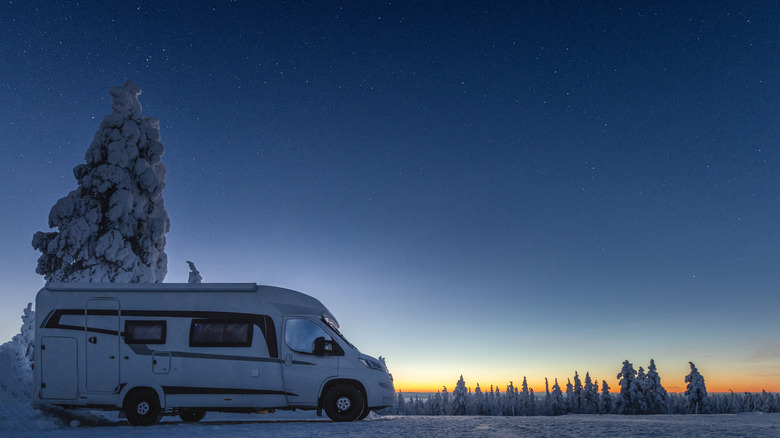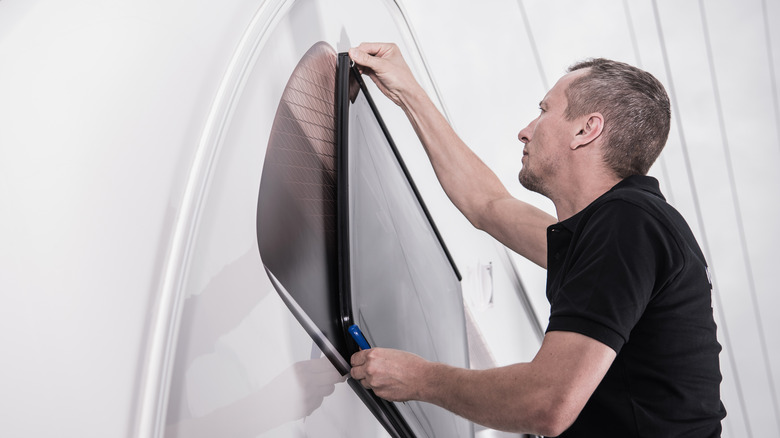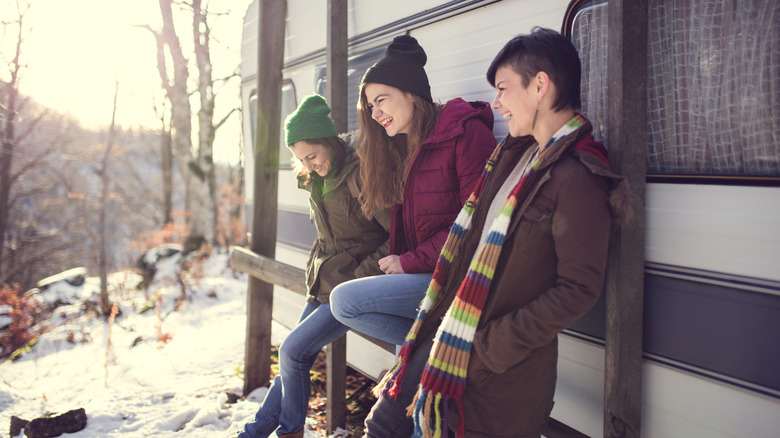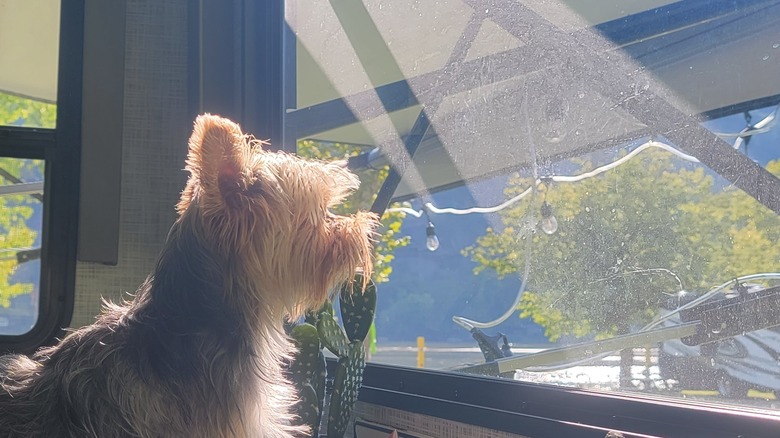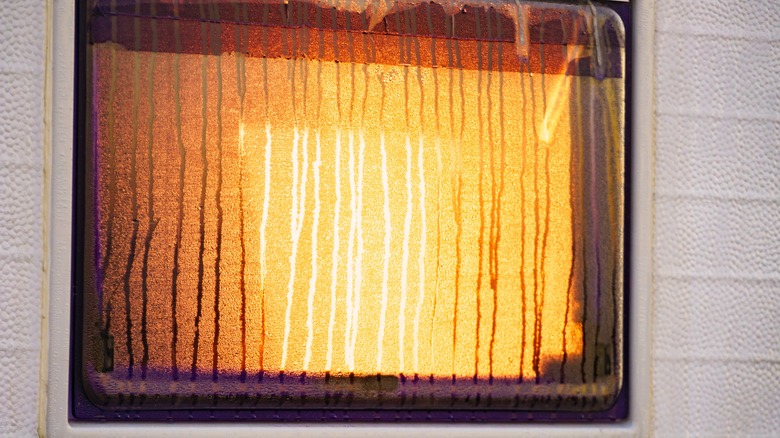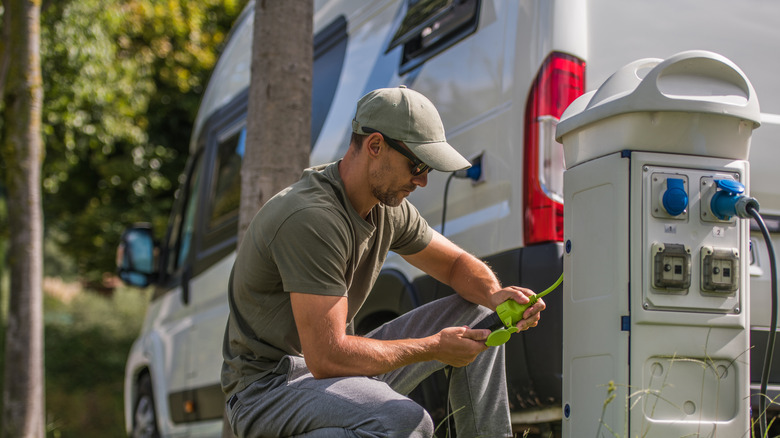Budget-Friendly Secrets For Keeping Your RV Warm
While many travelers rely on the 3-3-3 rule to make their trips manageable, some folks prefer spending much more time in their RV. Rather than fleeing to a warm destination for the winter months, these intrepid RVers enjoy camping all year long. Unless you live in a climate where it stays temperate all year, it can get pretty chilly in your RV during the colder seasons. Whether you're interested in full-time RV living or just spending a week admiring the natural beauty of a national park in January, you will need a strategy to stay warm.
Solar power is perfect for heating your RV in cold weather, so if you spend extended periods inside during the winter, you might want to make the investment. Getting a generator or installing a gas or diesel heater can also work and, depending on your setup, could be cheaper. However, there are ways to keep your RV from getting too cold without buying a new heating system.
Insulate your windows
If you want to wake up to a cozy and warm RV even when there's a fresh blanket of snow outside, you will need to keep the cold from getting in and your precious heat from getting out. RVs can be drafty places, so you'll want to insulate if you don't want to encounter a chill breeze on a winter morning. In addition to buying large rolls of thermal insulation that you can use anywhere in your RV, windows are the spots you want to focus on. Even when closed, they can let in a chill. Fortunately, you don't have to install all new doors and windows to stay warm — there are much cheaper alternatives.
When it comes to your windows and skylights, one of the most effective options is also one of the most affordable: a window insulation kit. You can buy enough of these layers of shrink film for up to five windows for around $10. If you still want to be able to open your windows (even though this will let cold air in), you can purchase thermal curtains for around $20 instead. You don't want to do anything that restricts the view on your front window, but you can still cut a piece of insulation to the size of your windshield for overnight use.
Choose the right campsite
You've done your research and are positive that you've chosen the perfect national park to enjoy outdoor adventures. Now it's time to determine precisely where you will park your RV for the night. There are a lot of factors to consider when it comes to choosing the best campsite, whether that means making sure there's enough space for your entire family to make snow angels or being close enough to the trails for a wintery solo hike. One thing you don't want to overlook? How you're going to stay warm.
To keep your RV from getting blasted with frigid winter winds, choose a campsite that is at least a little sheltered from the elements. Select one near the forest rather than a wide-open field with a clear view of the horizon. Fortunately, most campsites in a campground are the same or very similar in price, so you should be able to select one that will keep your RV warmer without blowing your budget.
Use the greenhouse effect
Solar energy is a great way to heat your RV, but just because you can't afford to install solar panels right now doesn't mean you can't use the sun to stay warm sometimes! Many regular campers are plagued by trying to keep their RV from heating up in the summer, but that can be a massive advantage in the winter. Vehicles grow warmer in the sunlight because of something called the greenhouse effect. Sunlight can come in through glass windows and heat the inside of the RV, but heat can't pass through the glass, so it all gets trapped inside. That's very frustrating when you burn yourself on your car's seat belt in July, but it can help warm your RV for free in the winter.
Though you likely try to park in a shady spot in the summer, in the winter, you may want to park somewhere in direct sunlight. Even the direction you park can make a big difference when keeping your RV warm. For instance, consider positioning your RV so the side with the most windows will have sunshine streaming in when you wake up.
Manage humidity without opening windows
Insulating your RV against the winter cold is a fantastic place to start — but it can lead to a humidity issue. When the outside air is cold, and the inside of the RV is warm, you may soon find the walls and surfaces collecting drops of water. The last thing you want is for the inside of your RV to be soggy, both because it's kind of gross to have all your things damp and because condensation can cause mold issues and damage your RV over time.
Most people will use one of the RV's vents or open a window a little to even things out, but that lets the cold air in. Fortunately, you can stay warm and dry by getting yourself a dehumidifier. You can buy a large, powerful dehumidifier for around $250. While it may be frustrating to add to your budget, it will keep you from wasting money by running the heat with a window open — and it's much cheaper than having to do major renovations on your RV because of condensation damage!
Choose an RV park with complimentary electricity
You can do many things to keep your RV warm, but when it comes down to it, you probably will need some heat so you don't get too cold while camping in the winter. This can be expensive, but if you're willing to do your research, you may be able to find an RV park where you can get electricity inexpensively or even free. If you can locate a good publicly managed RV site, you could score free parking and a free electricity hookup, but there may be limits on how long they'll allow you to stay.
If you're after a spot to pull up and keep warm for the night rather than looking for a secluded experience surrounded by wildlife, a casino or fairground may also offer free parking and electrical hookups. Some traditional campgrounds could also provide complimentary hookups, so keep an eye open! Suppose you can't find one that's free. In that case, you can also look for options that charge a flat fee no matter how much electricity you use so that you can warm up your RV, use your space heaters, and curl up under electric blankets without worrying that it'll be more expensive than you expected.
